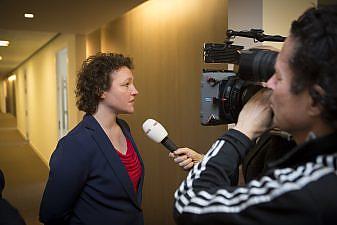Campaign for openness in the European Union
Campaign for openness in the European Union
On Monday, SP Member of Parliament Renske Leijten, together with fellow MPs Pieter Omtzigt of the centre-right CDA and Martin van Rooijen from seniors' party 50PLUS handed a letter to Eurogroup chair Mario Centeno containing a plea for more openness from the EU Council of Ministers and the Eurogroup of twenty-six parliaments from twenty member states. They want to see documents relating to decision-making in the two bodies made public and to be given access to voting figures. “The thrust of our argument is clear,” says Leijten. “The EU Council of Ministers is too much of a 'black box' for national MPs. It's never clear how negotiations are going or how the agenda has been arrived at.”
 The European Affairs Committee of the Dutch Parliament conducted an enquiry last year into transparency in legislative procedures at European level and concluded that as things stand MPs cannot effectively monitor the EU. In the paper Opening up closed doors – paper on EU transparency, published in English to be presented to an international conference of national parliamentary committees on EU affairs, the three rapporteurs stated on behalf of the Committee that institutions such as the EU Council of Ministers operate as a kind of 'black box'. It's never clear how negotiations are going and how policies on such matters as agriculture, pensions or migration matters are arrived at. Too many documents are regarded as confidential, which means that national parliaments and governments can't effectively monitor them. The gap between members states' citizens and the European Union is widened by the lack of transparency in relation to legislative procedures.
The European Affairs Committee of the Dutch Parliament conducted an enquiry last year into transparency in legislative procedures at European level and concluded that as things stand MPs cannot effectively monitor the EU. In the paper Opening up closed doors – paper on EU transparency, published in English to be presented to an international conference of national parliamentary committees on EU affairs, the three rapporteurs stated on behalf of the Committee that institutions such as the EU Council of Ministers operate as a kind of 'black box'. It's never clear how negotiations are going and how policies on such matters as agriculture, pensions or migration matters are arrived at. Too many documents are regarded as confidential, which means that national parliaments and governments can't effectively monitor them. The gap between members states' citizens and the European Union is widened by the lack of transparency in relation to legislative procedures.
This is the first time that a member state national parliament has attempted via inter-parliamentary cooperation to increase the public's involvement in the EU. “Never before have so many national parliaments combined their powers to get the Council to at last be more open,” says Leijten. “The days when the Council could ignore its own transparency rules are past. The national parliaments are now demanding more transparency.” Omtzigt adds that “openness is lacking for example when the Dutch government forces a new European pension law through Parliament with indecent haste, one which they had written themselves. We couldn't do much of a job of checking the contents. Democracy will only function if citizens can monitor what decisions are being taken by ministers. That elementary discipline is missing here.”
Leijten, Omtzigt and Van Rooijen are also organising a meeting with the Ombudsman, Access Info Europe, Transparency International and the Meijers Committee, an independent group of experts that researches and advises on European criminal, migration, refugee, privacy, non-discrimination and constitutional law. These organisations share the three MPs' goal of greater access. They point out that without transparency the corporate lobby has a free hand and that not only MPs but the member states cannot do their work, while the public and interest groups are unable to exercise any influence on decision-making. Aidan O’Sullivan of the European Ombudsman's office was critical of government leaders. “They say in their member states that they have to do something because of Europe, but we can't check whether they voted for the measure in the European Council,” he said.
- See also:
- Europe
